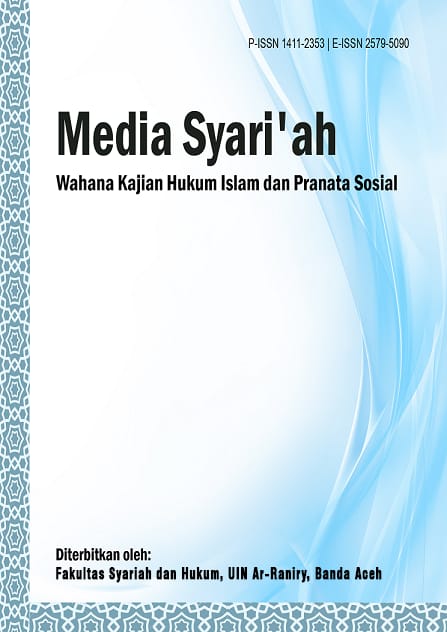Penundaan Pelaksanaan Keputusan Pejabat Tata Usaha Negara (Schorsing) yang Berpotensi Merusak Lingkungan
DOI:
https://doi.org/10.22373/jms.v21i2.2810Keywords:
keputusan tata usaha negara dan penundaanAbstract
Abstrak: Pasal 67 ayat 2, dengan demikian memberi hak kepada penggugat untuk “dalam keadaan tertentu” diperkenankan menyimpang asas praduga rechtmatig yang terdapat pada pasal 67 ayat 1. Kriteria penundaan pelaksanaan KTUN di dalam undang-undang hanya disebutkan harus terdapat keadaan yang sangat mendesak yang mengakibatkan kepentingan penggugat merasa dirugikan jika KTUN yang digugat itu tetap dilaksanakan. Dengan lahirnya Undang-Undang Nomor 30 Tahun 2014 tentang Administrasi Pemerintahan, kembali mengatur menganai penundaan pelaksanaan KTUN tersebut. Akan tetapi, ada perbedaan pengaturan penunndaan pelaksanaan KTUN tersebut dengan yang diatur dalam Pasal 67 Undang-Undang Nomor 5 Tahun 1986 tentang Peradilan Tata Usaha Negara. Hasil penelitian menunjukkan bahwa Undang-Undang Nomor 30 Tahun 2014 sebagai hukum materiil tidak mengatur secara detail mengenai hukum acara permohonan penundaan, sehingga berdasarkan asas lex specialis derogat legi generali hakim harus tetap berpatokan dengan aturan penundaan yang lama sampai dengan adanya aturan baru yang dapat mengakomodir pelaksanaan penundaan tersebut dan dalam menentapkan Penetapan Permohonan Penundaan tersebut Hakim harus tetap melihat urgensi Keputusan/Tindakan Pemerintah tersebut dapat ditunda dengan mempedomani hasil pemeriksaan atau audit dari auditor lingkungan hidup yang telah diberi sertifikasi oleh LSK auditor Lingkungan Hidup yang berada di bawah Kementerian Lingkungan Hidup, serta tidak bertentangan dengan “Kepentingan Umum”.
Abstract: Section 2 of article 67, consequently give the right to plaintiff “under certain circumstances” is permitted to deviate from the presumption of rechmatig principle presented in section 1 of article 67. Criteria for deferment implementation of KTUN mentioned that there must be a very urgent circumstance which is affected the importance of plaintiff become disadvantage by doing the postponement of KTUN. The enactment of constitution Number 30 of 2014 about government administration, it regulates the postponement of the implementation for KTUN. However, there are differences in the regulation in the implementation of KTUN arranged in article 67 of the constitution Number 5 of 1986 concerning about the justice of civil court. The result of study showed that the constitution Number 30 of 2014 as material law has been not regulate the detail of the regulation for the application of postponement, so it was applied base on the principle of lex specialist derogate legigenerali where the judge must be followed the previous law until the new law released with the ability to accommodate the implementation for the decision of deferment application. The judge still focus on the urgency of government policy by guiding the results of audits from environmental auditors certified by LSK auditor of the Ministry of Environment, and not contrary with “public interest”.
Downloads
Additional Files
Published
Issue
Section
License
MEDIA SYARI'AH: Wahana Kajian Hukum Islam dan Pranata Sosial has CC-BY-SA or an equivalent license as the optimal license for the publication, distribution, use, and reuse of scholarly work. Authors who publish with this journal agree to the following terms:
1. Authors retain copyright and grant the journal right of first publication with the work simultaneously licensed under a Creative Commons Attribution-ShareAlike 4.0 International License that allows others to share the work with an acknowledgment of the work's authorship and initial publication in this journal.
2. Authors are able to enter into separate, additional contractual arrangements for the non-exclusive distribution of the journal's published version of the work (e.g., post it to an institutional repository or publish it in a book), with an acknowledgment of its initial publication in this journal.
3. Authors are permitted and encouraged to post their work online (e.g., in institutional repositories or on their website) prior to and during the submission process, as it can lead to productive exchanges, as well as earlier and greater citation of published work (See The Effect of Open Access).
You are free to:
Share — copy and redistribute the material in any medium or format.
Adapt — remix, transform, and build upon the material for any purpose, even commercially.
The licensor cannot revoke these freedoms as long as you follow the license terms.
All papers published in MEDIA SYARI'AH: Wahana Kajian Hukum Islam dan Pranata Sosial are licensed under a Creative Commons Attribution-ShareAlike 4.0 International License.




.png)


.png)
.png)
.png)



